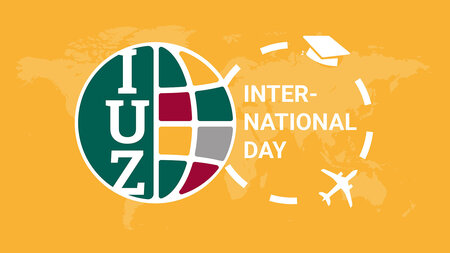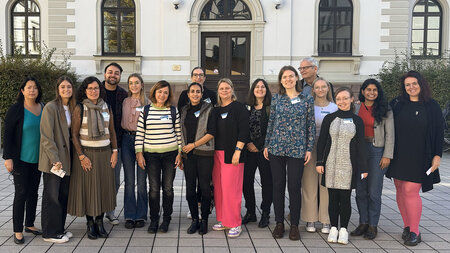"I will benefit from everything I have learned here"
Chinese PhD student Hu Chunfeng from the Fudan University in Shanghai talks about her research visit in Chemnitz
-

Participants of the summer school of the International Research Training Group “Materials and Concepts for Advanced Interconnects and Nanosystems“ in Warnemuende, including Hu Chunfeng (8th from right) Photo: Piotr Mackowiak
At the end of August, PhD students from Germany and China and their professors took part in the 9th Summer School of the International Research Training Group „Materials and Concepts for Advanced Interconnects and Nanosystems”. Ms. Hu Chunfeng from the Fudan University in Shanghai works in the IRTG and now stays for a research visit at Fraunhofer ENAS in Chemnitz for three months. Andrea Messig-Wetzel talked to Ms. Hu about her research work.
Ms. Hu Chunfeng, you are PhD student within the International Research Training Group „Materials and Concepts for Advanced Interconnects and Nanosystems”. Could you describe your research topic?
My research direction as a PhD student mainly focuses on the fabrication of zinc oxide thin film transistors (TFTs), which utilize the zinc oxide film or zinc oxide nanowires as the channel layer.
You have been working as PhD student in the IRTG since 2013. Why did you decide to work within this program?
The most important reason for me to participate in the IRTG program is that I am really curious about how German scientists do their research, and I hope to somewhat change my thinking by changing to a new environment.
Please tell us about your experiences you have made during your research visit in Chemnitz!
The first day when I came to Fraunhofer ENAS, my supervisor Dr. Kathleen Heinrich discussed with me in detail the work plan for the following three months. We decided to carry out investigations on the fabrication of the low temperature pyroelectric zinc oxide nanogenerators, which are based on the pyroelectric properties and piezoelectric properties of the zinc oxide nanowires. Dr. Kathleen Heinrich taught me step by step how to do the experiments, how to evaluate the results and also how to generate new ideas from the literature. Under her guidance, I have achieved some preliminary results. I will benefit from everything I have learned here. The research approaches I have learned here are really helpful for my future research.
How do you work at Fudan University in China?
At Fudan University, in the meantime to pursue the PhD degree, I work as a lab teacher in the integrated circuit process lab to teach the undergraduate students how to do the experiments. I really enjoy my stay in Germany since here I can devote myself to the research. In summary, my three-month stay in Chemnitz is already very fruitful and I benefit a lot from the cooperation between the Chinese and the German partners.
At the end of our talk, I would like to know, how you experience your German colleagues.
My German colleagues are rigorous and always seeking for high efficiency and precision in their work. The clean and well-organized labs also impressed me deeply. Since I join my colleagues for lunch every day and sometimes for the coffee break, I have experienced the unique culture and different customs. I found that beneath the distant face, my German colleagues are very friendly and hospitable. This summer I also participated in the annual Summer School and got to know that team work spirit is so important in the culture.
Keyword: 9th Summer School of International Research Training Group „Materials and Concepts for Advanced Interconnects and Nanosystems”
During the 9th Summer School in Warnemünde at the Baltic Sea, the German and Chinese PhD students discussed their research results together with the mentoring professors and scientists. Within its only International Research Training Group, Technische Universität Chemnitz cooperates with Fraunhofer ENAS, TU Berlin and Fraunhofer IZM from Germany, as well as with Fudan University Shanghai and Shanghai Jiao Tong University from China. Professor Thomas Gessner acts as the German coordinator of the IRTG. He is the director of the Center for Microtechnologies at the TU Chemnitz and of the Fraunhofer Institute for Electronic Nano Systems ENAS in Chemnitz. 16 German and 15 Chinese PhD students are working within the IRTG, which is funded by the German Research Foundation (DFG) of the Federal Republic of Germany and the Ministry of Education (MoE) of the People‘s Republic of China. The project started in 2006 and is now in the second phase of funding.
For more information please visit: https://www.zfm.tu-chemnitz.de/irtg
Mario Steinebach
13.09.2014





